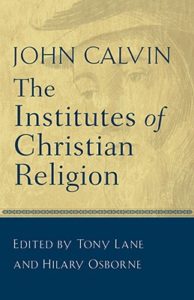Let’s face it, John Calvin’s Institutes is intimidating to many people, certainly to the uninitiated layperson. I suspect that there are also many of us in ministry who find it easier to quote Calvin than it is to actually read him. For instance, here is a little test: How many books are there in the Institutes? Can you summarize the gist of each one? What’s the big deal that Calvin puts justification after sanctification in book three? It’s remarkable how easy it is for us to talk about a book for successive years without truly understanding what that book is about.
According to Tony Lane, Calvin’s Institutes is “one of the most important theological works ever written.” So convinced of this is he, and of its relevance for today’s ministry needs, that Tony has teamed up with Hilary Osborne to create an abridged edition. It is a condensation of the 1559 edition, which retains the heart of Calvin’s teaching and all his major themes. Working from Henry Beveridge’s translation, Hillary Osborne has put the text into “simpler and more modern English.” The result is volume that is substantive and accessible for the average reader.
If we regard  Calvin’s teaching as valuable, and if the Institutes is his most significant theological work (which it is), and if we are keen to see those whom we serve grow in their doctrinal knowledge of Scripture and Christian living, then this book should be a standard part of our discipleship arsenal.
Calvin’s teaching as valuable, and if the Institutes is his most significant theological work (which it is), and if we are keen to see those whom we serve grow in their doctrinal knowledge of Scripture and Christian living, then this book should be a standard part of our discipleship arsenal.
It seems fitting to conclude with a selection from Calvin himself.
The Lord has ordained that those who will one day be crowned in heaven must have fought the good fight here on earth. There can be no triumph until we have overcome in the struggle of this life and gained the victory (3.9.3).
Does that statement not sound like Calvin? One more reason to read his Institutes for yourself.





